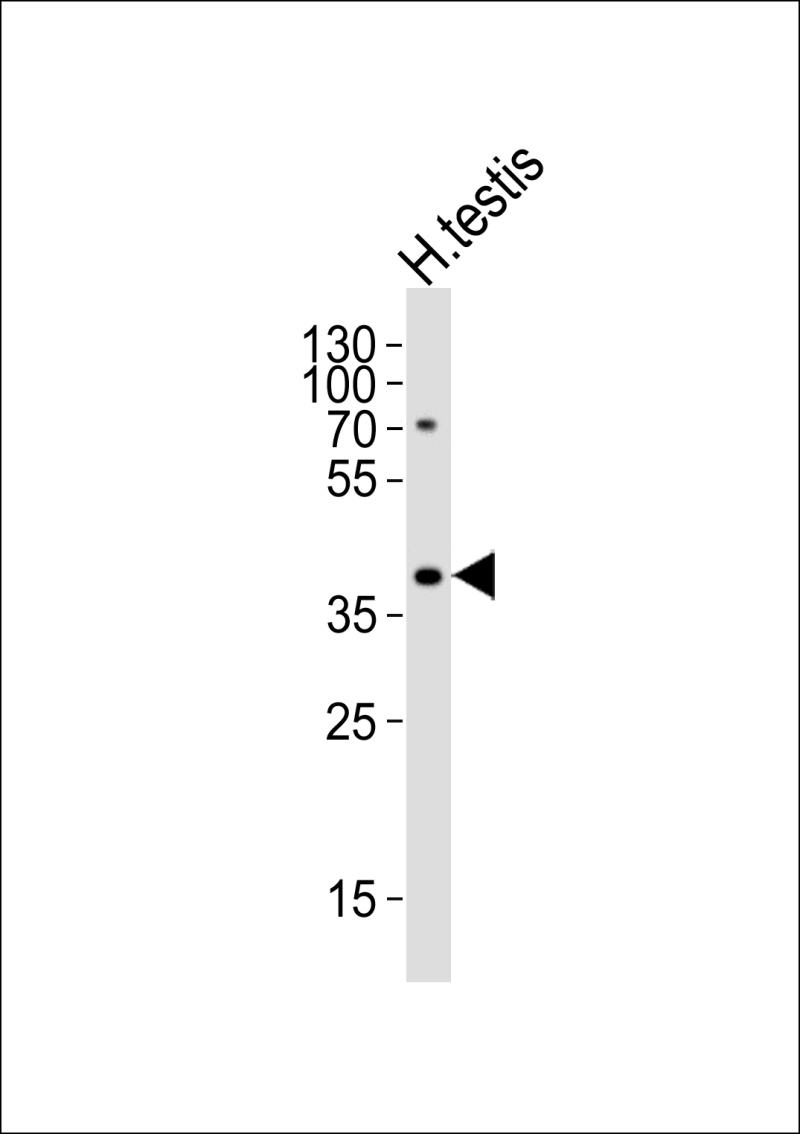
| WB | 1/1000 | Human,Mouse,Rat |
| IF | 咨询技术 | Human,Mouse,Rat |
| IHC | 咨询技术 | Human,Mouse,Rat |
| ICC | 技术咨询 | Human,Mouse,Rat |
| FCM | 咨询技术 | Human,Mouse,Rat |
| Elisa | 咨询技术 | Human,Mouse,Rat |
| Aliases | Testis-specific Y-encoded protein 2, Testis-specific Y-encoded protein Q1, TSPY2, TSPYQ1 |
| Entrez GeneID | 64591 |
| WB Predicted band size | 35.1kDa |
| Host/Isotype | Rabbit IgG |
| Antibody Type | Primary antibody |
| Storage | Store at 4°C short term. Aliquot and store at -20°C long term. Avoid freeze/thaw cycles. |
| Species Reactivity | Human |
| Immunogen | This TSPY2 antibody is generated from a rabbit immunized with a KLH conjugated synthetic peptide between 86-120 amino acids from the Central region of human TSPY2. |
+ +
以下是3篇涉及TSPY2抗体的代表性文献摘要(注:部分文献可能侧重TSPY家族而非TSPY2特异性研究,需根据实际需求筛选):
---
1. **文献名称**: "TSPY as a genetic modifier of HBV-related hepatocellular carcinoma"
**作者**: Lau YFC, et al.
**摘要**: 本研究通过免疫组化发现TSPY2蛋白在HBV相关肝细胞癌中异常表达,利用特异性抗体证实其与肿瘤增殖相关,提示其作为肝癌生物标志物的潜力。
2. **文献名称**: "The TSPY gene family: biological functions in normal and tumorigenic cells"
**作者**: Kido T, Lau YFC
**摘要**: 系统综述TSPY家族(含TSPY2)的生物学功能,重点讨论其抗体在检测睾丸特异性肿瘤和性腺外生殖细胞肿瘤中的应用,揭示其在癌症诊断中的价值。
3. **文献名称**: "Prostate cancer risk association of a Y chromosome-specific polymorphism is linked to reduced TSPY2 expression in vitro"
**作者**: Vodicka R, et al.
**摘要**: 通过Western blot和免疫荧光技术,使用TSPY2特异性抗体验证其在前列腺癌细胞系中的低表达,探讨其与男性Y染色体多态性及癌症风险的关联。
---
**注意**:若需精确获取TSPY2特异性抗体文献,建议通过PubMed等数据库以"TSPY2 antibody"+"cancer/application"为关键词进一步筛选。部分研究可能侧重于TSPY家族共性而非单独TSPY2.需结合实验细节判断。
**Background of TSPY2 Antibody**
The TSPY (testis-specific protein Y-encoded) gene family, located on the Y chromosome, encodes proteins predominantly expressed in the testis and implicated in spermatogenesis and cell cycle regulation. TSPY2. a member of this family, shares homology with TSPY1 but exhibits distinct expression patterns and potential functional roles. While TSPY1 is primarily associated with germ cell development and oncogenesis (e.g., testicular germ cell tumors and prostate cancer), TSPY2 remains less characterized, though studies suggest its involvement in similar pathways.
Antibodies targeting TSPY2 are critical tools for investigating its biological functions, localization, and expression profiles in both normal and pathological tissues. Due to the testis-specific nature of TSPY proteins, their expression in somatic cancers classifies them as cancer-testis antigens (CTAs), making them potential targets for immunotherapy. TSPY2 antibodies enable researchers to explore its role in tumorigenesis, immune evasion, and therapeutic resistance.
Clinically, TSPY2 antibodies may aid in diagnosing malignancies marked by aberrant TSPY2 expression or monitoring treatment responses. However, challenges persist in specificity due to sequence similarities within the TSPY family. Ongoing research aims to refine antibody design and validate applications in experimental and therapeutic contexts, bridging gaps in understanding TSPY2's contributions to reproductive biology and cancer.
×